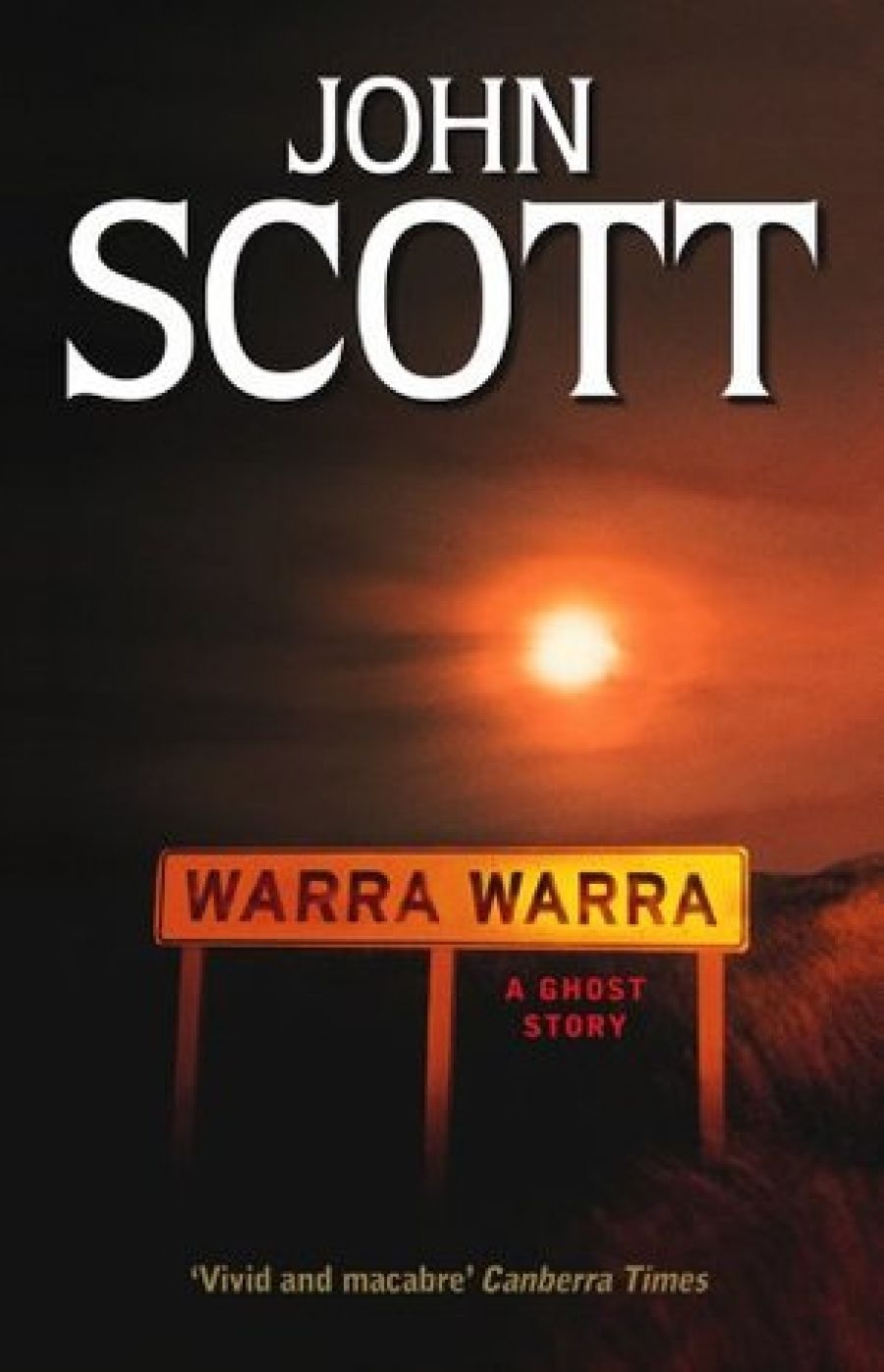
- Free Article: No
- Contents Category: Fiction
- Review Article: Yes
- Online Only: No
- Custom Highlight Text:
John Scott began his publishing life as a poet of considerable distinction (albeit as John A. Scott, as the second edition of The Oxford Companion to Australian Literature will not let him forget) and then changed brumbies in midstream to publish pure prose. Between 1975 and 1990 Scott delivered eight volumes of poetry; since then (there is a slight overlap), he has released five ‘novels’ (pardon nomenclatural nerves), if we include the present Warra Warra.
- Book 1 Title: Warra Warra
- Book 1 Subtitle: A ghost story
- Book 1 Biblio: Text Publishing, $23 pb, 222 pp
Scott’s poem St Clair shared the 1986 Victorian Premier’s Poetry Award, while his novel What I Have Written (subsequently filmed by John Hughes) won that state’s fiction award in 1994. Prose works Before I Wake and The Architect were shortlisted for the Miles Franklin Award. It seems not unjust to say that Scott’s work has been characterised by ‘European’ theoretical concerns, locales, and literary traditions, characteristics that have not endeared him to all readers. But he has always given pleasure to this reader, reminding him of, say, John Hawkes or Peter Handke.
So Warra Warra: A ghost story came as something of a surprise to your reviewer. It is not merely that the novel is located somewhere in rural Australia (an acknowledgment tells us that the novel was ‘mentally mapped around the Mudgee area of NSW’), but also that it is so distinctly what it claims to be – a ghost story. Nothing much happens in Warra Warra, until a jumbo jet explodes above the town, killing three hundred-odd passengers and crew, not to mention some citizens of the already underpopulated town. ‘For those who survive, though,’ the blurb promises us, ‘this is only the beginning of their nightmare.’ The dead are risen. The townsfolk must discover how to rid themselves of this imposition, this dead hand of the past.
For many years, Scott taught creative writing at the University of Wollongong, which is only appropriate for a one-time scriptwriter for ‘The Aunty Jack Show’. One mode of teaching writing, I understand, is to require students to compose genre pieces – seven sonnets on September 11, so to speak. The insistent subtitle, ‘A Ghost Story’, draws our attention to the genre, and there are times when Warra Warra reads like a genre piece by a very gifted creative writing major, though he has spared us the ‘Theoretical’ prolegomenon that some schools insist upon.
Warra Warra is sufficiently unlike Scott’s previous prose fiction for him to have changed publishers, from Penguin/Viking to Text. Perhaps it is his shot at Magic Realism (Down Under). If Mudrooroo can do it, why not Scott? One might theorise the insistent ghosts of the exploded British plane as a return of the colonial repressed, or something like that. But surely Australia, even remote rural Australia, in 2003 is rather more multicultural than that? Initially, I thought that Scott’s ghost story might be a geist story, a sort of horizontal September 11. But the ‘Acknowledgments’ inform us that the early drafts were written between September 2000 and January 2001. So that put the mockers on my theory.
At times, I could not decide whether the novel was in the tradition of Albert Camus or Stephen King. Was it an antipodean La Peste, or Carrie in Caringbah? Was I right in thinking that Scott’s focus-switching paragraphs bore the imprimatur of the ‘Wandering Rocks’ episode of Ulysses? Was I right in detecting touches of Steven Spielberg’s Poltergeist (‘They’re baaack!’)? Impossible to dismiss cinematic influence in a novel that, hilariously, has a priest study the rites of exorcism by watching The Exorcist. Scott’s last paragraph is pure Hollywood.
Perhaps I am being over-intellectual. Perhaps I have read Warra Warra in the determining context of Scott’s oeuvre. Perhaps Scott wanted to write a ghost story, and just a ghost story. Is there any such thing? (Professors of Cultural Studies, please help.) Perhaps, tired of the small sales of poetry, of the fact that The Architect wasn’t up there on the bestseller lists with three Bryce Courtenays and one (quite enough, thank you) Matthew Reilly, Scott ventured a shot at popular fiction and bestsellerdom. Bestsellerdoom. The problem is that Scott writes too well, thinks too rigorously. Not even Warra Warra should expect to be included in the egregious ‘Books Alive’ promotion.
Scott’s bibliography on the ‘Acknowledgments’ page suggests that there is nothing ‘mere’ about this ghost story. Lockerbie Incident Page, of course, and the Mudgee Information Service. But what of Pemulwy: The Rainbow Warrior; True Selves: Understanding Transsexualism; The Other Side of the Frontier: Aboriginal Resistance to the European Invasion of Australia; Terrorism – and others?
‘No one imagined that it would all be so different, of course not, there are seldom warnings with such things. Until your whole world changes, life goes on pretty much as it was – the good and the bad, dealt with or not dealt with – usual.’ A controlled opening, a reasonable tone. But soon control will not avail and the irrational will hold sway, though Scott will maintain a firm control over his plot, with developments and reversals proceeding calmly, which is more than can be said for the unfortunate townsfolk of Warra Warra.
I would like to wish John Scott all the successes of bestsellerdom, if that be what he wants. I can’t, however, help feeling that he has fallen between two stools. I wish The Architect had received the rewards and recognition it deserved.


Comments powered by CComment